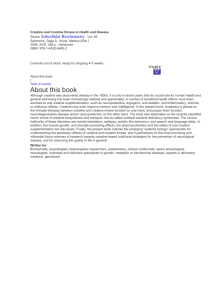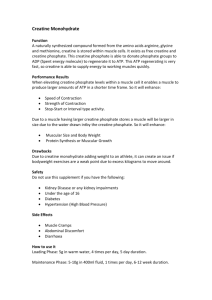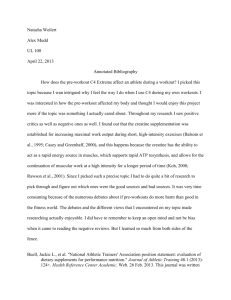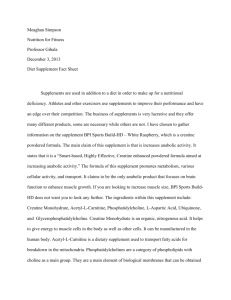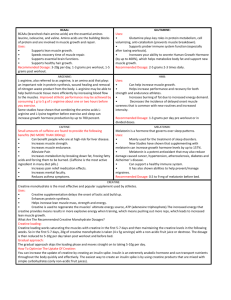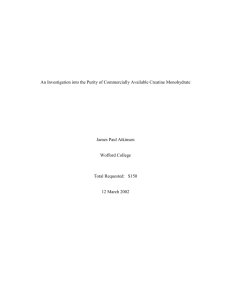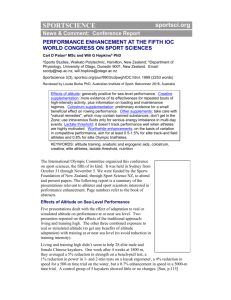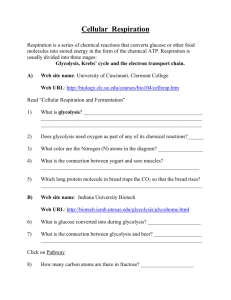complete reference list
advertisement
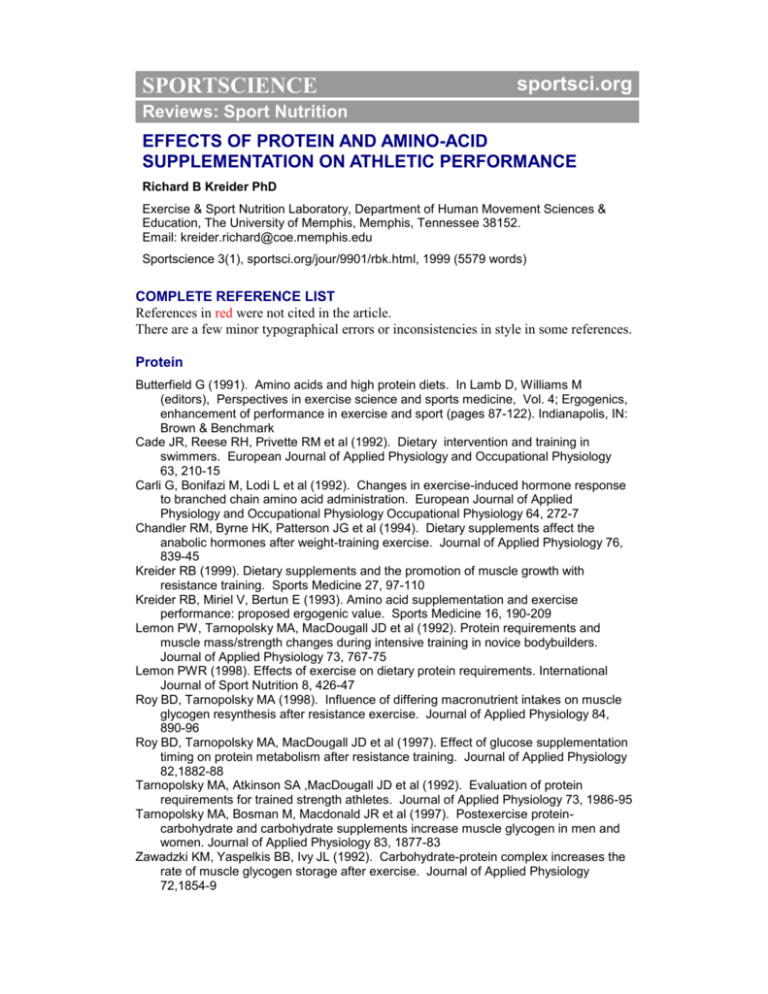
SPORTSCIENCE sportsci.org Reviews: Sport Nutrition EFFECTS OF PROTEIN AND AMINO-ACID SUPPLEMENTATION ON ATHLETIC PERFORMANCE Richard B Kreider PhD Exercise & Sport Nutrition Laboratory, Department of Human Movement Sciences & Education, The University of Memphis, Memphis, Tennessee 38152. Email: kreider.richard@coe.memphis.edu Sportscience 3(1), sportsci.org/jour/9901/rbk.html, 1999 (5579 words) COMPLETE REFERENCE LIST References in red were not cited in the article. There are a few minor typographical errors or inconsistencies in style in some references. Protein Butterfield G (1991). Amino acids and high protein diets. In Lamb D, Williams M (editors), Perspectives in exercise science and sports medicine, Vol. 4; Ergogenics, enhancement of performance in exercise and sport (pages 87-122). Indianapolis, IN: Brown & Benchmark Cade JR, Reese RH, Privette RM et al (1992). Dietary intervention and training in swimmers. European Journal of Applied Physiology and Occupational Physiology 63, 210-15 Carli G, Bonifazi M, Lodi L et al (1992). Changes in exercise-induced hormone response to branched chain amino acid administration. European Journal of Applied Physiology and Occupational Physiology Occupational Physiology 64, 272-7 Chandler RM, Byrne HK, Patterson JG et al (1994). Dietary supplements affect the anabolic hormones after weight-training exercise. Journal of Applied Physiology 76, 839-45 Kreider RB (1999). Dietary supplements and the promotion of muscle growth with resistance training. Sports Medicine 27, 97-110 Kreider RB, Miriel V, Bertun E (1993). Amino acid supplementation and exercise performance: proposed ergogenic value. Sports Medicine 16, 190-209 Lemon PW, Tarnopolsky MA, MacDougall JD et al (1992). Protein requirements and muscle mass/strength changes during intensive training in novice bodybuilders. Journal of Applied Physiology 73, 767-75 Lemon PWR (1998). Effects of exercise on dietary protein requirements. International Journal of Sport Nutrition 8, 426-47 Roy BD, Tarnopolsky MA (1998). Influence of differing macronutrient intakes on muscle glycogen resynthesis after resistance exercise. Journal of Applied Physiology 84, 890-96 Roy BD, Tarnopolsky MA, MacDougall JD et al (1997). Effect of glucose supplementation timing on protein metabolism after resistance training. Journal of Applied Physiology 82,1882-88 Tarnopolsky MA, Atkinson SA ,MacDougall JD et al (1992). Evaluation of protein requirements for trained strength athletes. Journal of Applied Physiology 73, 1986-95 Tarnopolsky MA, Bosman M, Macdonald JR et al (1997). Postexercise proteincarbohydrate and carbohydrate supplements increase muscle glycogen in men and women. Journal of Applied Physiology 83, 1877-83 Zawadzki KM, Yaspelkis BB, Ivy JL (1992). Carbohydrate-protein complex increases the rate of muscle glycogen storage after exercise. Journal of Applied Physiology 72,1854-9 2 Anabolic Amino Acids Bucci L, Hickson JF, Pivarnik JM et al (1990). Ornithine ingestion and growth hormone release in bodybuilders. Nutrition Research 10, 239-45 Carlson HE, Miglietta JT, Roginsky MS et al (1989). Stimulation of pituitary hormone secretion by neurotransmitter amino acids in humans. Metabolism 28, 1179-82 Evain-Brion D, Donnadieu M, Roger M et al (1982). Simultaneous study of somatotrophic and corticotrophic pituitary secretion during ornithine infusion test. Clinical Endocrinology 17, 119-22 Garlick PJ, Grant I (1988). Amino acid infusion increases the sensitivity of muscle protein synthesis in vivo to insulin. Biochemistry Journal 254, 579-84 Isidori A, Lo Monaco A, Cappa M (1981). A study of growth hormone release in man after oral administration of amino acids. Current Medical Research Opinion 74, 75-81 Iwasaki K, Mano K, Ishihara M et al (1987). Effects of ornithine or arginine administration on serum amino acid levels. Biochemical International 14, 971-6 Jackson D, Grant DB, Clayton B (1968). A simple oral test of growth hormone secretion in children. Lancet 2, 373-5 Knopf RF, Conn JW, Fajans SS et al (1965). Plasma growth hormone response to intravenous administration of amino acids. Journal of Clinical Endocrinology and Metabolism. 25,1140-4 Kreider RB (1999). Dietary supplements and the promotion of muscle growth with resistance training. Sports Medicine 27, 97-110 Kreider RB, Miriel V, Bertun E (1993). Amino acid supplementation and exercise performance: proposed ergogenic value. Sports Medicine 16, 190-209 Lemon PWR (1991). Protein and amino acid needs of the strength athlete. International Journal of Sport Nutrition. 1, 127-145 Merimee TJ, Lillicrap DA, Rabinowitz D (1965). Effect of arginine on serum levels of growth hormone. Lancet ii, 668-673 Merimee TJ, Rabinowitz D, Fineberg SE (1969). Arginine-initiated release of human growth hormone. New England Journal of Medicine 280, 1434-8 Branched-Chain Amino Acids Bailey SP, Davis JM, Ahlborn EN (1992). Effect of increased brain serotogenic (5-HTIC) activity on endurance performance in the rat. Acta Physiology Scandinavia 145,75-6 Bailey SP, Davis JM, Ahlborn EN (1993). Brain serotogenic activity affects endurance performance in the rat. International Journal of Sports Medicine 6, 330-3 Bailey SP, Davis JM, Ahlborn EN (1993). Neuroendocrine and substrate responses to altered brain 5-HT activity during prolonged exercise to fatigue. Journal of Applied Physiology 74, 3006-12 Blomstrand E, Celsing F, Newshome EA (1988). Changes in plasma concentrations of aromatic and branch-chain amino acids during sustained exercise in man and their possible role in fatigue. Acta Physiologica Scandinavica 133, 115-21 Blomstrand E, Perrett D, Parry-Billings M et al (1989). Effect of sustained exercise on plasma amino acid concentrations and on 5-hydroxytryptamine metabolism in six different brain regions in the rat. Acta Physiologica Scandinavica 136, 473-81 Bloomstrand E, Hassmen P, Ekblom B et al (1991). Administration of branch-chain amino acids during sustained exercise - effects on performance and on plasma concentration of some amino acids. European Journal of Applied Physiology 63, 838 Bloomstrand E, Hassmen P, Newsholme E (1991). Effect of branch-chain amino acid supplementation on mental performance. Acta Physiologica Scandinavica 143, 2256. Cade JR, Reese RH, Privette RM et al (1991). Dietary intervention and training in swimmers. European Journal of Applied Physiology and Occupational Physiology 63, 210-5. 3 Carli G, Bonifazi M, Lodi L et al (1992). Changes in exercise-induced hormone response to branched chain amino acid administration. European Journal of Applied Physiology and Occupational Physiology 64, 272-7. Castellino P, Luzi L, Simonson DC et al (1987). Effect of insulin and plasma amino acid concentrations of leucine metabolism in man. Journal of Clinical Investigations 80, 1784-93 Chaouloff F, Kennett GA, Serrurier B et al (1986). Amino acid analysis demonstrates that increased plasma free tryptophan causes the increase of brain tryptophan during exercise in the rat. Journal of Neurochemistry 46, 1647-50 Chaouloff F, Laude D, Guezennec Y et al (1986). Motor activity increases tryptophan5hydroxyinoleacetic acidand homovanillic acid in ventricular cerbrospinal fluid of the conscious rat. Journal of Neurochemistry 46, 1313-16 Chaouloff FE, lgohozi JL, Guezennec Y et al (1985). Effects of conditioned running on plasma, liver and brain tryptophan and on brain 5-hydroxytryptamine metabolism of the rat. British Journal of Pharmacology 86, 33-41 Coombes J, McNaughton L (1995). The effects of branched chain amino acid supplementation on indicators of muscle damage after prolonged strenuous exercise. Medicine and Science in Sports and Exercise 27, S149 (abstract) Davis JM (1995). Carbohydrates, branched-chain amino acids, and endurance, The central fatigue hypothesis. International Journal of Sport Nutrition 5, S29-38. Davis JM, Bailey SP, Jackson DA et al (1993). Effects of a serotonin (5-HT) agonist during prolonged exercise to fatigue in humans. Medicine and Science in Sports and Exercise 25, S78 (abstract) Davis JM, Baily SP, Woods JA et al (1992). Effects of carbohydrate feedings on plasma free tryptophan and branched-chain amino acids during prolonged cycling European Journal of Applied Physiology and Occupational Physiology 65, 513-19 Galiano FJ, Davis JM, Bailey SP et al (1992). Physiological, endocrine and performance effects of adding branch chain amino acids to a 6% carbohydrate electrolyte beverage during prolonged cycling. Medicine and Science in Sports and Exercise 23, S14 (abstract) Garlick PJ, Grant I (1986). Amino acid infusion increases the sensitivity of muscle protein synthesis in vivo to insulin. Biochemistry Journal 254, 579-84 Gastmann UA, Lehmann MJ (1998). Overtraining and the BCAA hypothesis. Medicine & Science in Sports and Exercise 30, 1173-8. Greenhaff PL, Leiper JB, Ball D et al (1991). The influence of dietary manipulation on plasma ammonia accumulation during incremental exercise in man. European Journal of Applied Physiology 63, 338-44 Hefler SK, Wildman L, Gaesser GA et al (1993). Branched-chain amino acid (BCAA) supplementation improves endurance performance in competitive cyclists. Medicine and Science in Sports and Exercise 25, S24 (abstract) Hutton JC, Sener A, Malaisse WJ (1980). Interaction of branched-chain amino acids and keto acids upon pancreatic islet metabolism and insulin secretion. Journal of Biological Chemistry 255, 7340-6 Kargotich S, Rowbottom DG, Keast D et al (1996). Plasma glutamine changes after high intensity exercise in elite male swimmers. Medicine and Science in Sport and Exercise 28, S133 (abstract) Kreider R, Miriel V, Tulis D et al (1996). Effects of amino acid supplementation during a 25-week intercollegiate swim season on leukocytic response to swimming. International Conference on Overreaching & Overtraining in Sport Conference Abstracts 1, 76 (abstract) Kreider RB (1998). Central fatigue hypothesis and overtraining. In Kreider RB, Fry AC, O’Toole M (editors), Overtraining in Sport (pages 309-31). Champaign, IL: Human Kinetics Publishers. Kreider RB (1999). Dietary supplements and the promotion of muscle growth with resistance training. Sports Medicine 27, 97-110 Kreider RB, Jackson CW (1994). Effects of amino acid supplementation on psychological status during and intercollegiate swim season. Medicine and Science in Sports and Exercise 26, S115 (abstract) 4 Kreider RB, Miller GW, Mitchell M et al (1992). Effects of amino acid supplementation on ultraendurance triathlon performance. In Proceedings of the I World Congress on Sport Nutrition (pages 488-536). Barcelona, Spain: Enero Kreider RB, Miriel V, Bertun E (1993). Amino acid supplementation and exercise performance: proposed ergogenic value. Sports Medicine 16, 190-209 Kreider RB, Ratzlaff R, Bertun E et al (1993). Effects of amino acid and carnitine supplementation on immune status during an intercollegiate swim season. Medicine and Science in Sports and Exercise 25, S123 (abstract) Lancranjan IA, Wirz-Justice A, Puhringer W et al (1977). Effect of L-5-hydroxytryptophan infusion of growth hormone and prolactin secretion in man. Journal of Endocrinology and Metabolism 45, 588- 93 Lehmann M, Huonker M, Dimeo F et al (1995). Serum amino acid concentrations in nine athletes before and after the 1993 Colmar Ultra Triathlon. International Journal of Sports Medicine 16, 155-9 Mittleman KD, Ricci MR, Baily SP (1998). Branched-chain amino acids prolong exercise during heat stress in men and women. Medicine and Science in Sports and Exercise 30, 83-91 Mourier A, Bigard AX, de Kerviler E (1997). Combined effects of caloric restriction and branched-chain amino acid supplementation on body composition and exercise performance in elite wrestlers. International Journal of Sports Medicine 18, 47-55 Nemoto I, Tanaka A, Kuroda Y (1996). Branched-chain amino acid (BCAA) supplementation improves endurance capacities and RPE. Medicine and Science in Sports and Exercise 28, S37 (abstract) Newsholme EA, Parry-Billings M, McAndrew M et al (1991). Biochemical mechanism to explain some characteristics of overtraining. In Brouns F (editor): Medical Sports Science, Vol. 32, Advance in Nutrition and Top Sport (pages 79-93). Basel, Karger Petruzzello SJ, Landers DM, Pie J et al (1992). Effect of branched-chain amino acid supplements on exercise-related mood changes. Medicine and Science in Sports and Exercise 24, S2 (abstract) Schena F, Guerrine F, Tregnaghi P (1993). Effects of branched-chain amino acid supplementation on amino acid metabolism during endurance exercise. Medicine and Science in Sports and Exercise 25, S24 (abstract) Taylor T, Kreider R, Ramsey L et al (1996). Effects of amino acid supplementation during a 25-week intercollegiate swim season on fasting immunoglobulins & leukocytes. International Conference on Overreaching & Overtraining in Sport Conference Abstracts 1, 76 (abstract) van Hall G, Raaymakers JS, Saris WH (1995). Ingestion of branched-chain amino acids and tryptophan during sustained exercise in man: failure to affect performance. Journal of Physiology 486, 789-94 van Hall G, van der Vusse GJ, Söderlund K et al (1995). Deamination of amino acids as a source for ammonia production in human skeletal muscle during prolonged exercise. Journal of Physiology 489, 251-61 Vandewalle L, Wagenmakers AJM, Smets K et al (1991). Effect of branched-chain amino acid supplements on exercise performance in glycogen depleted subjects. Medicine and Science in Sports and Exercise 23, S116 (abstract) Wagenmakers AJ (1998). Muscle amino acid metabolism at rest and during exercise: role in human physiology and metabolism. In Holloszy JO (editor): Exercise and Sport Sciences Reviews (pages 287-314). Baltimore, MD: Williams & Wilkins Wagenmakers AJM, Bechers EJ, Brouns F et al (1991). Carbohydrate supplementation, glycogen depletion, and amino acid metabolism during exercise. American Journal of Physiology 260, E883-90 Wagenmakers AJM, Smets K, Vandewalle L et al (1991). Deamination of branched-chain amino acids: a potential source of ammonia production during exercise. Medicine and Science in Sports and Exercise 23, S116 (abstract) Wilson WM, Maughan RJ (1992). Evidence for a possible role of 5-hydroxytryptamine in the genesis of fatigue in man: Administration of paroxetinea 5-HT re-uptake inhibitor reduces the capacity to perform prolonged exercise. Journal of Physiology 77, 921-4 5 Glutamine Kargotich S, Rowbottom DG, Keast D et al (1996). Plasma glutamine changes after high intensity exercise in elite male swimmers. Medicine and Science in Sport and Exercise 28, S133 (abstract) Kreider RB (1998). Central fatigue hypothesis and overtraining. In Kreider RB, Fry AC, O’Toole ML (editors): Overtraining in Sport (pages 308-31). Champaign, IL: Human Kinetics Kreider RB, Leutholtz B (1993). Nutrition for the immune system: The role of amino acids. Journal of Optimal Nutritrion 2, 278-91 Low SY, Taylor PM, Rennie MJ (1996). Responses of glutamine transport in cultured rat skeletal muscle to osmotically induced changes in cell volume. Journal of Physiology (London) 492( Pt 3), 877-85 Newsholme EA, Calder PC (1997). The proposed role of glutamine in some cells of the immune system and speculative consequences for the whole animal. Nutrition 13, 728-30 Nieman DC, Pedersen BK (1999). Exercise and immune function. Recent developments. Sports Medicine 27, 72-80 Parry-Billings M, Blomstrand E, Leighton B et al (1990). Does endurance exercise impair glutamine metabolism? Canadian Journal of Sport Science 13, 13P (abstract) Parry-Billings M, Blomstrand E, McAndrew N et al (1990). A communicational link between skeletal muscle, brain and cells of the immune system. International Journal of Sports Medicine 11, S122-8 Parry-Billings M, Budgett R, Koutedakis K et al (1992). Plasma amino acid concentrations in the overtraining syndrome: Possible effects on the immune system. Medicine and Science in Sport and Exercise 24, 1353-8 Rennie MJ (1996). Glutamine metabolism and transport in skeletal muscle and heart and their clinical relevance. Journal of Nutrition 126(4), 1142S-9S Rennie MJ, Tadros L, Khogali S et al (1994). Glutamine transport and its metabolic effects. Journal of Nutrirtion 124(8), 1503S-8S Rohde T, Asp S, MacLean DA et al (1998). Competitive sustained exercise in humans, lymphokine activated killer cell activity, and glutamine--an intervention study. European Journal of Applied Physiology 78, 448-53 Varnier M, Leese GP, Thompson J et al (1995). Stimulatory effect of glutamine on glycogen accumulation in human skeletal muscle. American Journal of Physiology 269(2 Pt 1), E309-15 Creatine Almada A, Kreider R, Ferreira M et al (1997). Effects of calcium ß-HMB supplementation with or without creatine during training on strength & sprint capacity. FASEB Journal 11, A374 (abstract) Almada A, Kreider R, Weiss L et al (1995). Effects of ingesting a supplement containing creatine monohydrate for 28 days on isokinetic performance. Medicine and Science in Sports and Exercise 27, S146 (abstract) Almada A, Mitchell T, Earnest C (1996). Impact of chronic creatine supplementation on serum enzyme concentrations. FASEB Journal 10, A791 (abstract) Andrews R, Greenhaff P, Curtis S et al (1998). The effect of dietary creatine supplementation on skeletal muscle metabolism in congestive heart failure. European Heart Journal 19, 617-22 Arias-Mendosa F, Konchanin LM, Grover WD et al (1998). Possible creatine synthesis deficit studied by in vivo magnetic resonance spectroscopy. Medicine and Science in Sports and Exercise 30, S234 (abstract) Balsom P, Söderlund K, Ekblom B (1994). Creatine in humans with special reference to creatine supplementation. Sports Medicine 18, 268-80 Balsom P, Söderlund K, Sjodin B et al (1995). Skeletal muscle metabolism during short duration high-intensity exercise: Influence of creatine supplementation. Acta Physiologica Scandinavica 154, 303-10 6 Balsom PD, Ekblom B, Söderlund K et al (1993). Creatine supplementation and dynamic high-intensity intermittent exercise. Scandinavian Journal of Medicine and Science in Sports 3, 143-9 Balsom PD, Harridge S, Söderlund K et al (1993). Creatine supplementation per se does not enhance endurance exercise performance. Acta Physiologica Scandinavica 149, 521-3 Barnett C, Hinds M, Jenkins DG (1996). Effects of oral creatine supplementation on multiple sprint cycle performance. Australian Journal of Science and Medicine in Sports 28, 35-39 Becque M, Lochmann JD, Melrose D (1997). Effect of creatine supplementation during strength training on 1-RM and body composition. Medicine and Science in Sports and Exercise 29S, 146 (abstract) Bessman S, Savabi F (1988). The role of phosphocreatine energy shuttle in exercise and muscle hypertrophy. In Conway M, Clark J (editors): Creatine and creatine phosphate: Scientific and clinical perspectives (pages 185-98). San Diego, CA: Academic Press Bessman SP, MohanC (1992). Phosphocreatine, exercise, protein synthesis, and insulin. In De Deyn PP, Maresceau B, Statin V et al (editors): Guanidino compounds in biology and medicine (pages 181-6). London, John Libbey and Company Birch R, Nobel D, Greenhaff P (1994). The influence of dietary creatine supplementation on performance during repeated bouts of maximal isokinetic cycling in man. European Journal of Applied Physiology 69, 268-76 Bosco C, Tihanyi J, Pucspk J et al (1997). Effect of oral creatine supplementation on jumping and running performance. International Journal of Sports Medicine 18, 36972 Bosco C, Tranquilli C, Tihanyi J et al (1995). Influence of oral supplementation with creatine monohydrate on physical capacity evaluated in laboratory and field tests. Medicina dello Sport 48, 391-4 Brannon T, Adams GR, Conniff CL et al (1997). Effects of creatine loading and training on running performance and biochemical properties of rat skeletal muscle. Medicine and Science in Sports and Exercise 29, 489-95 Brees AJ, Cordain L, Harris M et al (1994). Alterations in leg extension power of meat eating and non-meat eating females with creatine supplementation. FASEB Journal 8, A308 (abstract) Brzezinska Z, Nazar K, Kaciuba-Uscilko H et al (1998). Effect of a short-term dietary creatine supplementation on high-energy phosphates in the rat myocardium. Physiology and Pharmacology 49(4), 591-5 Burke L, Pyne LD, Telford R (1996). Effect of oral creatine supplementation on singleeffort sprint performance in elite swimmers. International Journal of Sports Nutrition 6, 222-33 Casey A, Constantin-Teodosiu D, Howell S et al (1996). Creatine ingestion favorably affects performance and muscle metabolism during maximal exercise in humans. American Journal of Physiology 271, E31-7 Chanutin A (1926). The fate of creatine when administered to man. Journal of Biological Chemistry 67, 29-34 Chetlin R, Schoenleber J, Bryner R (1998). The effects of two forms of oral creatine supplementation on anaerobic performance during the Wingate test. Journal of Strength and Conditioning Research 12, 273 (abstract) Clark JF (1996). Uses of creatine phosphate and creatine supplementation for athletes. In Conway MA, Clark JF (editors): Creatine and creatine phosphate: Scientific and clinical perspectives (pages 217-26). San Diego, CA: Academic Press Clark JF (1997). Creatine and phosphocreatine, a review of their use in exercise and sport. Journal of Athletic Training 32, 45-50 Clark JF (1998). Creatine, a review of its nutritional applications in sport. Nutrition 14, 322-4 Clark JF, Field ML, Ventura-Clapier R (1996). An introduction to the cellular creatine kinase system in contractile tissue. In Conway MA, Clark JF (editors): Creatine and creatine phosphate, Scientific and clinical perspectives (pages 51-64). San Diego, CA: Academic Press 7 Clark JF, Odoom J, Tracey I et al (1996). Experimental observations of creatine phosphate and creatine metabolism. In Conway MA, Clark JF (editors): Creatine and creatine phosphate: Scientific and clinical perspectives (pages 33-50). San Diego, CA: Academic Press Constantin-Teodosiu D, Greenhaff P, Gardiner S et al (1995). Attenuation by creatine of myocardial metabolic stress in Brattleboro rats caused by chronic inhibition of nitric oxide synthase. British Journal of Pharmacology 116, 3288-92 Conway MA, Clark JF (1996). Creatine and creatine phosphate: Future perspectives. In Conway MA, Clark JF (editors): Creatine and creatine phosphate, Scientific and clinical perspectives (pages 227-9). San Diego, CA: Academic Press Conway MA, Clark JF (editors) (1996). Creatine and creatine phosphate, scientific and clinical perspectives. San Diego, CA: Academic Press Conway MA, Ouwerkerk R, Rajagopalan B et al (1996). Creatine phosphate: in vivo human cardiac metabolism studied by magnetic resonance spectroscopy. In Conway MA, Clark JF (editors): Creatine and creatine phosphate: scientific and clinical perspectives (pages 127-59). San Diego, CA: Academic Press Conway MA, Rajagopalan B, Radda GK (1996). Skeletal muscle metabolism in heart failure. In Conway MA, Clark JF (editors): Creatine and creatine phosphate: Scientific and clinical perspectives (pages 162-82). San Diego, CA: Academic Press Cooke W, Barnes WS (1997). The influence of recovery duration on high-intensity exercise performance after oral creatine supplementation. Canadian Journal of Applied Physiology 22, 454-67 Cooke W, Grandjean PW, Barnes WS (1995). Effect of oral creatine supplementation on power output and fatigue during bicycle ergometry. Journal of Applied Physiology 78, 670-73 Crim MC, Calloway DH, Margen S (1975). Creatine metabolism in men, urinary creatine and creatinine excretions with creatine feedings. Journal of Nutrition 105, 428-38 Crim MC, Calloway DH, Margen S (1976). Creatine metabolism in men, creatine pool size and turnover in relation to creatine intake. Journal of Nutrition 106, 371-81. Crowder T, Jensen N, Richmond S et al (1998). Influence of creatine type and diet on strength and body composition of collegiate lightweight football players. Medicine and Science in Sports and Exercise 30, S264 (abstract) Dawson B, Cutler M, Moody A et al (1995). Effects of oral creatine loading on single and repeated maximal short sprints. Australian Journal of Science and Medicine in Sports 27, 56-61. Delanghe J, De Slypere JP, De Buyzere M (1989). Normal reference values for creatine, creatinine, carnitine are lower in vegetarians. Clinical Chemistry 35, 1802-3 Earnest C, Almada A, Mitchell T (1996). High-performance capillary electrophoresis-pure creatine monohydrate reduced blood lipids in men and women. Clinical Science 91, 113-8 Earnest C, Almada A, Mitchell T (1996). Influence of chronic creatine supplementation on hepatorenal function. FASEB Journal 10, A790 (abstract) Earnest C, Snell P, Rodriguez R et al (1995). The effect of creatine monohydrate ingestion on anaerobic power indices muscular strength and body composition. Acta Physiologica Scandinavica 153, 207-9 Earnest CP, Almada AL, Mitchell TL (1997). Effects of creatine monohydrate ingestion on intermediate duration anaerobic treadmill running to exhaustion. Journal of Strength and Conditioning Research 11, 234-8 Earnest CP, Beckham S, Whyte BO (1998). Effect of acute creatine ingestion on anaerobic performance. Medicine and Science in Sports and Exercise 30, S141 (abstract) Ekblom B (1996). Effects of creatine supplementation on performance. American Journal of Sports Medicine 24, S38-9 Engelhardt M, Neumann G, Berbalk A et al (1998). Creatine supplementation in endurance sports. Medicine and Science in Sports and Exercise 30, 1123-9 Ensign WY, Jacobs I, Prusaczyk WK et al (1998). Effects of creatine supplementation on short-term anaerobic exercise performance of U.S. Navy Seals. Medicine and Science in Sports and Exercise 30, S265 (abstract) 8 Febbraio MA, Flanagan TR, Snow R et al (1995). Effect of creatine supplementation on intramuscular TCr metabolism and performance during intermittent supramaximal exercise in humans. Acta Physiologica Scandanavica 155, 387-95 Ferraro S, Codella C, Palumbo F et al (1996). Hemodynamic effects of creatine phosphate in patients with congestive heart failure, a double-blind comparison versus placebo. Clinical Cardiology 19, 699-703 Ferreira M, Kreider R, Wilson M et al (1997). Effects of ingesting a supplement designed to enhance creatine uptake on strength and sprint capacity. Medicine and Science in Sports and Exercise 29, S146 (abstract) Gilliam JD, Hohzom C, Martin AD (1998). Effect of oral creatine supplementation on isokinetic force production. Medicine and Science in Sports and Exercise 30, S140 (abstract) Godly A, Yates JW (1997). Effects of creatine supplementation on endurance cycling combined with short, high-intensity bouts. Medicine and Science in Sports and Exercise 29, S251 (abstract) Goldberg PG, Bechtel PJ (1997). Effects of low dose creatine supplementation on strengthspeed and power events by male athletes. Medicine and Science in Sports and Exercise 29, S251 (abstract) Gordon A, Hultman E, Kaijser L (1995). Creatine supplementation in chronic heart failure increases skeletal muscle creatine phosphate and muscle performance. Cardiovascular Research 30, 413-8 Green AL, Greenhaff PL, MacdonaldI A et al (1993). The influence of oral creatine supplementation on metabolism during sub-maximal incremental treadmill exercise. Proceedings of the Nutrition Society 53, 84A (Abstract) Green AL, Hultman E, Macdonald IA et al (1996). Carbohydrate feeding augments skeletal muscle creatine accumulation during creatine supplementation in humans. American Journal of Physiology 271, E821-6 Green AL, Simpson EJ, Littlewood JJ et al (1996). Carbohydrate ingestion augments creatine retention during creatine feeding in humans. Acta Physiologica Scandanavica 158, 195-202. Greenhaff P (1995). Creatine and its application as an ergogenic aid. International Journal of Sports Nutrition 5, S100-10 Greenhaff P (1998). Renal dysfunction accompanying oral creatine supplements. Lancet 352, 233-4 Greenhaff PL (1996). Creatine supplementation, recent developments. British Journal of Sports Medicine 30, 276-277. Greenhaff PL (1997) The nutritional biochemistry of creatine. Journal of Nutritional Biochemistry 11, 610-8 Greenhaff PL, Bodin K, Harris R et al (1993b). The influence of oral creatine supplementation on muscle phosphocreatine resynthesis following intense contraction in man. Journal of Physiology 467, 75P (abstract) Greenhaff PL, Bodin K, Söderlund K et al (1994a). Effect of oral creatine supplementation on skeletal muscle phosphocreatine resynthesis. American Journal of Physiology 266, E725-30 Greenhaff PL, Casey A, Green A (1996). Creatine supplementation revisited, an update. Insider 4(3), 1-2 Greenhaff PL, Casey A, Short A et al (1993a). Influence of oral creatine supplementation on muscle torque during repeated bouts of maximal voluntary exercise in man. Clinical Science 84, 565-71 Greenhaff PL, Constantin-Teodosiu D, Casey A et al (1994b). The effect of oral creatine supplementation on skeletal muscle ATP degradation during repeated bouts of maximal voluntary exercise in man. Journal of Physiology 476, 84P (abstract) Greenhaff PL, Nevill ME, Söderlund K et al (1992). Energy metabolism in single muscle fibers during maximal sprint exercise in man. Journal of Physiology 446, 528P (abstract) Grindstaff P, Kreider R, Weiss L et al (1995). Effects of ingesting a supplement containing creatine monohydrate for 7 days on isokinetic performance. Medicine and Science in Sports and Exercise 27, S146 (abstract) 9 Grindstaff PD, Kreider R, Bishop R et al (1997). Effects of creatine supplementation on repetitive sprint performance and body composition in competitive swimmers. International Journal of Sports Nutrition 7, 330-46. Guerroro-Ontiveros ML, Wallimann T (1998). Creatine supplementation in health and disease. Effects of chronic creatine ingestion in vivo, down-regulation of the expression of creatine transporter isoforms in skeletal muscle. Molecular and Cellular Biochemistry 184, 427-37 Hamilton-Ward K, Meyers M, Skelly WA et al (1997). Effect of creatine supplementation on upper extremity anaerobic response in females. Medicine and Science in Sports and Exercise 29, S146 (abstract) Harris RC, Söderlund K, Hultman E (1992). Elevation of creatine in resting and exercised muscle of normal subjects by creatine supplementation. Clinical Science 83, 367-74. Haughland RB, Chang DT (1975). Insulin effects on creatine transport in skeletal muscle. Proceedings of the Society of Experimental Biology and Medicine 148, 1-4 Häussinger D, Roth E, Lang F et al (1993). Cellular hydration state, an important determinant of protein catabolism in health and disease. Lancet 341, 1330-2 Hirvonen J, Rehunen S, Rusko H et al (1987). Breakdown of high-energy phosphate compounds and lactate accumulation during short supramaximal exercise. European Journal of Applied Physiology 56, 253-9. Hoberman HD, Sims EA, Peters JH (1948). Creatine and creatinine metabolism in the normal male adult studied with the aid of isotopic nitrogen. Journal of Biological Chemistry 172, 45-51. Horn M, Frantz S, Remkes H et al (1998). Effects of chronic dietary creatine feeding on cardiac energy metabolism and on creatine content in heart, skeletal muscle, brain, liver and kidney. Journal of Molecular and Cellular Cardiology 30, 277-84 Hultman E, Bergstrom J, Spriet L et al (1990). Energy metabolism and fatigue. In Taylor A, Gollnick P, Green H (editors): Biochemistry of Exercise VII (pages 73-92). Champaign, IL: Human Kinetics Hultman E, Söderland K, Timmons JA (1996). Muscle creatine loading in men. Journal of Applied Physiology 81, 232-7. Hunt J, Kreider R, Melton C et al (1999). Creatine does not increase incidence of cramping or injury during pre-season college football training II. Medicine and Science in Sports and Exercise 31(5), In press (abstract) Ingwall JS (1976). Creatine and the control of muscle-specific protein synthesis in cardiac and skeletal muscle. Circulation Research 38, I-115-23 Ingwall JS, Morales MF, Stockdale FE (1972). Creatine and the control of myosin synthesis in differentiating skeletal muscle. Proceedings of the National Academy of Sciences 69, 2250-3 Ingwall JS, Weiner CD, Morales MF et al (1974). Specificity of creatine in the control of muscle protein synthesis. Journal of Cellular Biology 63, 145-51 Jacobs I, Bleue S, Goodman J (1997). Creatine ingestion increases anaerobic capacity and maximal accumulated oxygen deficit. Canadian Journal of Applied Physiology 22, 231-43 Jacobs KA, Leenders NYJM, Sherman WM et al (1998). Creatine (CR) supplementation and swimming. Medicine and Science in Sports and Exercise 30, S264 (abstract) Javierre C, Lizarraga MA, Ventura JL et al (1997). Creatine supplementation does not improve physical performance in a 150 m race. Revista Espanola de Fisiologia 53, 343-8 Johnson KD, Smodic B, Hill R (1997). The effects of creatine monohydrate supplementation on muscular power and work. Medicine and Science in Sports and Exercise 29, S251 (abstract) Jones AM, Atter T, George KP (1998). Oral creatine supplementation improves multiple sprint performance in elite ice-hockey players. Medicine and Science in Sports and Exercise 30, S140 (abstract) Kehnder M, Rico-Sanz J, Kuhne G et al (1998). Muscle phosphocreatine and glycogen concentrations in humans after creatine and glucose polymer supplementation measured noninvasively by 31P and 13C-MRS. Medicine and Science in Sports and Exercise 30, S264 (abstract) 10 Kelly VG, Jenkins DG (1998). Effect of oral creatine supplementation on near-maximal strength and repeated sets of high-intensity bench press exercise. Journal of Strength and Conditioning Research 12, 109-15 Khanna NK, Madan BR (1978). Studies on the anti-inflammatory activity of creatine. Archives Internationales de Pharmacodynamie 231, 340-50 Kirksey K, Warren BJ, Stone MH et al (1997). The effects of six weeks of creatine monohydrate supplementation in male and female track athletes. Medicine and Science in Sports and Exercise 29, S145 (abstract) Knehans A, Bemben M, Bemben D et al (1998). Creatine supplementation affects body composition and neuromuscular performance in football athletes. FASEB Journal 12, A863 (abstract) Kreider R, Ferreira M, Wilson M et al (1997). Effect of creatine supplementation with and without glucose on body composition in trained and untrained men and women. Journal of Strength and Conditioning Research 11, 283 (abstract) Kreider R, Ferreira M, Wilson M et al (1997). Effects of ingesting a supplement designed to enhance creatine uptake on body composition during training. Medicine and Science in Sports and Exercise 29, S145 (abstract) Kreider R, Ferreira M, Wilson M et al (1997). Effects of ingesting a supplement designed to enhance creatine uptake on body composition during training. Medicine and Science in Sports and Exercise 29, S145 (abstract) Kreider R, Ferreira M, Wilson M et al (1998). Effect of creatine supplementation with and without glucose on repetitive sprint performance in trained and untrained men and women. International Journal of Sports Nutrition 8, 204-5 (abstract). Kreider R, Ferreira M, Wilson M et al (1998). Effects of creatine supplementation on body composition, strength, and sprint performance. Medicine and Science in Sports and Exercise 30, 73-82 Kreider R, Grindstaff P, Wood L et al (1996). Effects of ingesting a lean mass promoting supplement during resistance training on isokinetic performance. Medicine and Science in Sports and Exercise 28, S36 (abstract) Kreider R, Melton C, Hunt C et al (1999). Creatine does not increase incidence of cramping or injury during pre-season college football training I. Medicine and Science in Sports and Exercise 31(5), In press (abstract) Kreider R, Ransom J, Rasmussen C et al (1999). Creatine supplementation during preseason football training does not affect markers of renal function. FASEB Journal 13, In press (abstract) Kreider R, Rasmussen C, Ransom J et al (1998). Effects of creatine supplementation during training on the incidence of muscle cramping, injuries and GI distress. Journal of Strength and Conditioning Research 12, 275 (abstract) Kreider R, Wood L, Bullen D et al (1995). Effects of ingesting a supplement containing creatine monohydrate on isokinetic performance. Journal of Strength and Conditioning Research 9, 282-83 (abstract) Kreider RB (1998). Creatine supplementation, analysis of ergogenic value, medical safety, and concerns. Journal of Exercise Physiologyonline 1(1), www.css.edu/users/tboone2/asep/jan3.htm Kreider RB (1998). Creatine: the next ergogenic supplement? In Sport science Training and technology: Internet Society for Sport Science. http://www.sportsci.org/traintech/creatine/rbk.html Kreider RB (1999). Dietary supplements and the promotion of muscle growth with resistance training. Sports Medicine 27, 97-110 Kreider RB, Klesges R, Harmon K et al (1996). Effects of ingesting supplements designed to promote lean tissue accretion on body composition during resistance training. International Journal of Sport Nutrition 6, 234-46. Kreis R, Koster M, Kambler M et al (1997). Peak assignment in localized 1h MR spectra of human muscle based on oral creatine supplementation. Magnetic Resonance in Medicine 37, 159-3. Kuehl K, Goldberg L, Elliot D (1998). Renal insufficiency after creatine supplementation in a college football athlete. Medicine and Science in Sports and Exercise 30, S235 (abstract) 11 Kurosawa Y, Iwane H, Hamaoka T et al (1997). Effects of oral creatine supplementation on high- and low-intensity grip exercise performance. Medicine and Science in Sports and Exercise 29, S251 (abstract) Kurosawa Y, Katsumura T, Hamaoka T et al (1998). Effects of oral creatine supplementation on localized muscle performance and muscle creatine phosphate concentration. Japanese Journal of Physical Fitness and Sports Medicine 47, 361-6 Kurosawa Y, Katsumura T, Hamaoka T et al (1998). Effects of oral creatine supplementation on muscle oxidative capacity during dynamic grip exercise. Medicine and Science in Sports and Exercise 30, S141 (abstract) Larson DE, Hunter GR, Trowbridge CA et al (1998). Creatine supplementation and performance during off-season training in female soccer players. Medicine and Science in Sports and Exercise 30, S264 (abstract) Leenders N, Lesniewski L, Sherman W et al (1996). Dietary creatine supplementation and swimming performance. Overtraining and Overreaching in Sports Conference Abstracts 1, 80 (abstract) Lefavi RG, McMillan JL, Kahn PJ et al (1998). Effects of creatine monohydrate on performance of college baseball and basketball players. Journal of Strength and Conditioning Research 12, 275 (abstract). Lemon P, Boska M, Bredle D et al (1995). Effect of oral creatine supplementation on energetics during repeated maximal muscle contraction. Medicine and Science in Sports and Exercise 27, S204 (abstract) Loike JD, Zalutsky DL, Kaback E et al (1988). Extracellular creatine regulates creatine transport in rat and human muscle cells. Proceedings of the National Academy of Sciences 85, 807-11 Ma TM, Friedman DL, Roberts R (1996). Creatine phosphate shuttle pathway in tissues with dynamic energy demand. In Conway MA, Clark JF (editors): Creatine and creatine phosphate, Scientific and clinical perspectives (pages 17-32). San Diego, CA: Academic Press Maganaris CN, Maughan RJ (1998). Creatine supplementation enhances maximum voluntary isometric force and endurance capacity in resistance trained men. Acta Physiologica Scandinavica 163, 279-87 Matthews RT, Yang L, Jenkins BG et al (1998). Neuroprotective effects of creatine and cyclocreatine in animal models of Huntington’s disease. Journal of Neuroscience 18, 156-63 Maughan R (1995). Creatine supplementation and exercise performance. International Journal of Sports Nutrition 5, 94-101. McNaughton LR, Dalton B, Tarr J (1998). The effects of creatine supplementation on high-intensity exercise performance in elite performers. European Journal of Applied Physiology 78, 236-40 Melton C, Kreider R, Rasmussen C et al (1999). Effects of ingesting creatine containing supplements during training on blood lipid profiles. FASEB Journal 13, In press (abstract) Michaelis J, Vukovich MD (1998). Effect of two different forms of creatine supplementation on muscular strength and power. Medicine and Science in Sports and Exercise 30, S272 (abstract) Mihic S, MacDonald JR, McKenzie S et al (1998). The effect of creatine supplementation on blood pressure, plasma creatine kinase, and body composition. FASEB Journal 12, A652 (abstract) Miller EE, Evans AE, Cohn M (1993). Inhibition of rate of tumor growth by creatine and cyclocreatine. Proceedings of the National Academy of Sciences 90, 3304-8 Miszko TA, Baer JT, Vanderbergh PM (1998). The effect of creatine loading on body mass and vertical jump of female athletes. Medicine and Science in Sports and Exercise 30, S141 (abstract) Mujika I, Chatard JC, Lacoste L et al (1996). Creatine supplementation does not improve sprint performance in competitive swimmers. Medicine and Science in Sports and Exercise 28, 1435-41. Mujika I, Padilla S (1997). Creatine supplementation as an ergogenic aid for sports performance in highly trained athletes, a critical review. International Journal of Sports Medicine 18, 491-6 12 Myburgh KH, Bold A, Bellinger B et al (1996). Creatine supplementation and sprint training in cyclists, metabolic and performance effects. Medicine and Science in Sports and Exercise 28, S81 (abstract) Nelson A, Day R, Glickman-Weiss E et al (1997). Creatine supplementation raises anaerobic threshold. FASEB Journal 11, A589 (abstract) Newsholme EA, Beis I (1996). Old and new ideas on the roles of phosphagens and the kinases. In Conway MA, Clark JF (editors): Creatine and creatine phosphate, Scientific and clinical perspectives (pages 3-15). San Diego, CA: Academic Press Noonan B, French J, Street G (1998). Creatine supplementation and multiple skating task performance in Division I hockey players. Medicine and Science in Sports and Exercise 30, S310 (abstract) Noonan D, Berg K, Latin RW et al (1998). Effects of varying dosages of oral creatine relative to fat free body mass on strength and body composition. Journal of Strength and Conditioning Research 12, 104-8 Odland LM, MacDougall JD, Tarnopolsky M et al (1997). Effect of oral creatine supplementation on muscle [PCr] and short-term maximum power output. Medicine and Science in Sports and Exercise 29, 216-9 Ööpik V, Pääsuke M, Timpmann S et al (1998). Effect of creatine supplementation during rapid body mass reduction on metabolism and isokinetic muscle performance capacity. European Journal of Applied Physiology 78, 83-92 Ööpik V, Timpmann S, Medijainen L (1995). The role and application of dietary creatine supplementation in increasing physical performance capacity. Biology of Sport 12, 197-12 Pauletto P, Strumia E (1996). In Conway MA, Clark JF (editors): Creatine and creatine phosphate, Scientific and clinical perspectives (pages 185-98). San Diego, CA: Academic Press Peeters BM, Lantz CD, Mayhew JL (1999). Effect of oral creatine monohydrate and creatine phosphate supplementation on maximal strength indices, body composition, and blood pressure. Journal of Strength and Conditioning Research. In press. Peyrebrune MC, Nevill ME, Donaldson FJ et al (1998). The effects of oral creatine supplementation on performance in single and repeated sprint swimming. Journal of Sports Sciences 16, 271-9 Pirola V, Pisani L, Teruzzi P (1991). Evaluation of the recovery of muscular trophicity in aged patients with femoral fractures treated with creatine phosphate and physiokinesitherapy. Clinica Terapeutica 139, 115-9 (Italian) Plisk SS, Kreider RB (1999). Creatine controversy? Strength and Conditioning Journal 21, 14-23 Poortmans JR, Francaux M (1999). Long-term oral creatine supplements do not impair renal function in healthy athletes. Medicine and Science in Sports and Exercise 31(5), In press (abstract). Poortmans JR, Auquier H, Renaut V et al (1997). Effect of short-term creatine supplementation on renal responses in men. European Journal of Applied Physiology 76, 566-7 Poortmans JR, Francaux M (1998). Renal dysfunction accompanying oral creatine supplements [letter]. Lancet 352, 234 Prevost MC, Nelson AG, Morris GS (1997). Creatine supplementation enhances intermittent work performance. Research Quarterly for Exercise and Sport 68, 233-40 Pritchard NR, Kaira PA (1998). Renal dysfunction accompanying oral supplements. Lancet 351, 1252-3 Ransom J, Kreider R, Hunt J et al (1999). Effects of creatine supplementation during training on markers of catabolism and muscle and liver enzymes. Medicine and Science in Sports and Exercise 31(5), In press (abstract) Rasmussen C, Kreider R, Ransom J et al (1999). Creatine supplementation during preseason football training does not affect fluid or electrolyte status. Medicine and Science in Sports and Exercise 31(5), In press Rawson ES, Clarkson PM, Melanson EL (1998). The effects of oral creatine supplementation on body mass, isometric strength, and isokinetic performance in older individuals. Medicine and Science in Sports and Exercise 30, S140 (abstract) 13 Redondo D, Dowling EA, Graham BL et al (1996). The effect of oral creatine monohydrate supplementation on running velocity. International Journal of Sports Nutrition 6, 213-21 Rossiter HB, Cannel TR, Jakeman PM (1996). The effect of oral creatine supplementation on the 1000-m performance of competitive rowers. Journal of Sports Science 14, 175-9 Ruden TM, Parcell AC, Ray ML et al (1996). Effects of oral creatine supplementation on performance and muscle metabolism during maximal exercise. Medicine and Science in Sports and Exercise 28, S81 (abstract) Saks V, Stepanov V, Jaliashvili I et al (1996). Molecular and cellular mechanisms of action for cardioprotective and therapeutic role of creatine phosphate. In Conway MA, Clark JF (editors): Creatine and creatine phosphate: Scientific and clinical perspectives (pages 91-114). San Diego, CA: Academic Press. Saks VA (1996). Cardiac energetics, compartmentation of creatine kinase and regulation of oxidative phosphorylation. In Conway MA, Clark JF (editors): Creatine and creatine phosphate: Scientific and clinical perspectives (pages 65-78). San Diego, CA: Academic Press Saks VA, Rosenshtraukh LV, Smirnov VN et al (1978). Role of creatine phosphokinase in cellular function and metabolism. Canadian Journal of Physiology and Pharmacology 56, 691-706 Satolli F, Marchesi G (1989). Creatine phosphate in the rehabilitation of patients with muscle hypnotrophy (sic) of the lower extremity. Current Therapeutic Research 46, 67-73 Schaufelberger M, Swedberg K (1998). Is creatine supplementation helpful for patients with chronic heart failure? European Heart Journal 19, 533-4 Schneider DA, McDonough PJ, Fadel PJ et al (1997). Creatine supplementation and the total work performed during 15-s and 1-min bouts of maximal cycling. Australian Journal of Science and Medicine in Sports 29, 65-8 Schneider K, Hervig L, Ensign WY et al (1998). Use of supplements by U.S. Navy Seals. Medicine and Science in Sports and Exercise 30, S60 (abstract). Sipilä I, Rapola J, Simell O et al (1981). Supplementary creatine as a treatment for gyrate atrophy of the choroid and retina. New England Journal of Medicine 304, 867-70 Smart NA, McKenzie SG, Nix LM et al (1998). Creatine supplementation does not improve repeat sprint performance in soccer players. Medicine and Science in Sports and Exercise 30, S140 (abstract) Smith JC, Stephens DP, Hall EL et al (1998). Effect of oral creatine ingestion on parameters of the work rate-time relationship and time to exhaustion in high-intensity cycling. European Journal of Applied Physiology 77, 360-5. Smith SA, Montain SJ, Matott RP et al (1998). Creatine supplementation and age influence muscle metabolism during exercise. Journal of Applied Physiology 85, 1349-56 Snow RJ, McKenna MJ, Selig SE et al (1998). Effect of creatine supplementation on sprint exercise performance and muscle metabolism. Journal of Applied Physiology 84, 1667-73 Söderlund K, Balsom PD, Ekblom B (1994). Creatine supplementation and high intensity exercise, influence on performance and muscle metabolism. Clinical Science 87 (Supplement), 120-1 Stevenson SW, Dudley GA (1998). Creatine supplementation and resistance exercise. Journal of Strength and Conditioning Research 12, 278 (abstract) Stockler S, Hanefeld F (1997). Guanidinoacetate methyltransferase deficiency, a newly recognized inborn error of creatine biosynthesis. Wiener Klinische Wochenschrift 109(3), 86-8 Stockler S, Hanefeld F, Frahm J (1996) Creatine replacement therapy in guanidinoacetate methyltransferase deficiency, a novel inborn error of metabolism. Lancet 21; 348, 789-90 Stockler S, Holzbach U, Hanefeld F et al (1994). Creatine deficiency in the brain, a new, treatable inborn error of metabolism. Pediatric Research 36, 409-13 14 Stockler S, Isbrandt D, Hanefeld F et al (1996). Guanidinoacetate methyltransferase deficiency, the first inborn error of creatine metabolism in man. American Journal of Human Genetics 58, 914-22 Stockler S, Marescau B, De Deyn PP et al (1997). Guanidino compounds in guanidinoacetate methyltransferase deficiency, a new inborn error of creatine synthesis. Metabolism 46, 1189-93 Stone MH, Sanborn K, Smith L et al (1999). Effects of in-season (5 weeks) creatine and pyruvate supplementation on anaerobic performance and body composition in American football players. International Journal of Sports Nutrition, In press. Stout JR, Echerson J, Noonan D et al (1999). The effects of a supplement designed to augment creatine uptake on exercise performance and fat free mass in football players. Nutrition Research 19, 217-25 Stroud M, Holliman D, Bell D et al (1994). Effect of oral creatine supplementation on respiratory gas exchange and blood lactate accumulation during steady-state incremental treadmill exercise and recovery in man. Clinical Science 87, 707-10. Syllum-Rapoport I, Daniel A, Rapoport S (1980). Creatine transport into red blood cells. Acta Biologica et Medica Germanica 39, 771-9 Syrotuik DG, Bell GJ, Burnham R et al (1998). Absolute and relative strength performance following creatine monohydrate supplementation combined with periodized resistance training. Journal of Strength and Conditioning Research 12, 278 (abstract) Tarnopolsky MA, Roy BD, McDonald JR (1997). A randomized, controlled trial of creatine monohydrate in patients with mitochondrial cytopathies. Muscle and Nerve 20, 15029 Terrillion KA, Kolkhorst FW, Dolgener FA et al (1997). The effect of creatine supplementation on two 700-m maximal running bouts. International Journal of Sports Nutrition 7, 138-43 Theodoru AS, Cooke CB, King R et al (1998). The effect of combined carbohydrate and creatine ingestion on anaerobic performance. Medicine and Science in Sports and Exercise 30, S272 (abstract) Thompson CH, Kemp GJ, Sanderson AJ et al (1996). Effect of creatine on aerobic and anaerobic metabolism in skeletal muscle in swimmers. British Journal of Sports Medicine 30, 222-5 Thorensen E, McMillam J, Guion K et al (1998). The effect of creatine supplementation on repeated sprint performance. Journal of Strength and Conditioning Research 12, 278 (abstract) Toler SM (1997). Creatine is an ergogen for anaerobic exercise. Nutrition Reviews 55, 213 van Leemputte M, Vandenberghe K, Hespel P (1999). Shortening of muscle relaxation time after creatine loading. Journal of Applied Physiology 86, 840-4 Vanakoski J, Kosunen V, Meririnne E et al (1998). Creatine and caffeine in anaerobic and aerobic exercise, effects on physical performance and pharmacokinetic considerations. International Journal of Clinical Pharmacology and Therapeutics 36, 258-62 Vandenberghe K, Gillis N, Van Leemputte M et al (1996A). Caffeine counteracts the ergogenic action of muscle creatine loading. Journal of Applied Physiology 80, 452-7 Vandenberghe K, Goris M, Van Hecke P et al (1996). Prolonged creatine intake facilitates the effects of strength training on intermittent exercise capacity. Insider 4(3), 1-2 Vandenberghe K, Goris M, Van Hecke P et al (1997). Long-term creatine intake is beneficial to muscle performance during resistance training. Journal of Applied Physiology 83, 2055-63 Vandenberghe K, Van Hecke P, Van Leemputte M et al (1997). Inhibition of muscle phosphocreatine resynthesis by caffeine after creatine loading. Medicine and Science in Sports and Exercise 29, S249 (abstract) Vannas-Sulonen K, Sipilä I, Vannas A et al (1985). Gyrate atrophy of the choroid and retina. Ophthalmology 92, 1719-27 Viru M, Ööpik V, Nurmekivi A et al (1994). Effect of creatine intake on the performance capacity in middle-distance runners. Coaching and Sport Science Journal 1, 31-6 15 Volek JS (1997). Creatine supplementation and its possible role in improving physical performance. ACSM Health Fitness Journal 1(4), 23-29. Volek JS, Boetes M, Bush JA et al (1997B). Response of testosterone and cortisol concentrations to high-intensity resistance exercise following creatine supplementation. Journal of Strength and Conditioning Research 11, 182-187. Volek JS, Kraemer WJ (1996). Creatine supplementation, its effect on human muscular performance and body composition. Journal of Strength an Conditioning Research 10, 200-10 Volek JS, Kraemer WJ, Bush JA et al (1997). Creatine supplementation enhances muscular performance during high-intensity resistance exercise. Journal of the American Dietetic Association 97, 765-70 Vukovich MD, J Michaelis (1999). Effect of two different creatine supplementation products on muscular strength and power. Sports Medicine, Training, and Rehabilitation 8, 369-83 Walker JB (1960). Metabolic control of creatine biosynthesis I, effect of dietary creatine. Journal of Biological Chemistry 235, 2357-61 Walker JB (1960). Metabolic control of creatine biosynthesis II, restoration of transamidinase activity following creatine repression. Journal of Biological Chemistry 236, 493-8 Walker JB (1979). Creatine, biosynthesis, regulation, and function. Advances in Enzymology 50, 177-242 Wallimann T, Dolder M, Schlattner U et al (1998). Some new aspects of creatine kinase (CK): compartmentation, structure, function and regulation for cellular and mitochondrial bioenergetics and physiology. Biofactors 8(3-4), 229-34 Walters PH, Olrich TW (1998). The effect of creatine supplementation on strength performance. Journal of Strength and Conditioning Research 12, 279 (abstract) Warber JP, Patton JF, Tharion WJ et al (1998). Effects of creatine monohydrate supplementation on physical performance. FASEB Journal 12, A1040 (abstract) Whittingham TS, Lipton P (1981). Cerebral synaptic transmission during anoxia is protected by creatine. Journal of Neurochemistry 37, 1618-21 Williams MH, Branch JD (1998). Creatine supplementation and exercise performance, an update. Journal of the American College of Nutrition 17, 216-34 Williams MH, Kreider RB, Branch JD (1999). Creatine: The Power Supplement. Champaign, IL: Human Kinetics Publishers. Wood KK, Zabik RM, Dawson ML et al (1998). The effects of creatine monohydrate supplementation on strength, lean body mass, and circumferences in male weightlifters. Medicine and Science in Sports and Exercise 30, S272 (abstract) Zehnder M, Rico-Sanz J, Kuhne G et al (1998). Muscle phosphocreatine and glycogen concentrations in humans after creatine and glucose polymer supplementation measured noninvasively by 31P and 13C-MRS. Medicine and Science in Sports and Exercise 30, S264 (abstract) Ziegenfuss T, Gales D, Felix S et al (1998). Performance benefits following a five day creatine loading procedure persist for at least four weeks. Medicine and Science in Sports and Exercise 30, S265 (abstract) Ziegenfuss T, Lemon PW, Rogers MR et al (1997). Acute creatine ingestion, effects on muscle volume, anaerobic power, fluid volumes, and protein turnover. Medicine and Science in Sports and Exercise 29, S127 (abstract) Ziegenfuss TN, Lowery LM, Lemon PWR (1998). Acute fluid volume changes in men during three days of creatine supplementation. Journal of Exercise Physiologyonline 1(3), http://www.css.edu/users/tboone2/asep/jan3.htm Hydroxymethylbutyrate (HMB) Almada A, Kreider R, Ferreira M et al (1997). Effects of calcium -HMB supplementation with or without creatine during training on strength and sprint capacity FASEB Journal 11, A374 (abstract) Kreider R, Ferreira M, Wilson M et al (1997). Effects of calcium -HMB supplementation with or without creatine during training on body composition alterations. FASEB Journal 11, A374 (abstract) 16 Kreider RB (1999). Dietary supplements and the promotion of muscle growth with resistance training. Sports Medicine 27, 97-110 Kreider RB, Ferreira M, Wilson M et al (1999). Effects of calcium -hydroxy methylbutyrate (HMB) supplementation during resistance-training on markers of catabolism, body composition and strength. International Journal of Sports Medicine, In press. Miller P, Sandberg L, Fuller JC (1997). The effect of intensive training and -hydroxy-methylbutyrate (HMB) on the physiological response to exercise in horses. FASEB Journal 11, A1683 (abstract) Nair KS, Schwartz RG, Welle S (1992). Leucine as a regulator of whole body and skeletal muscle protein metabolism in humans. American Journal of Physiology 263(5 Pt 1), E928-34 Nissen S, Faidley TD, Zimmerman DR et al (1994). Colostral milk fat and pig performance are enhanced by feeding the leucine metabolite -hydroxy-methylbutyrate to sows. Journal of Animal Science 72, 2331-7 Nissen S, Panton L, Fuller J et al (1997). Effect of feeding -hydroxy--methylbutyrate (HMB) on body composition and strength of women. FASEB Journal 11, A150 (abstract) Nissen S, Sharp R, Ray M et al (1996). Effect of leucine metabolite beta-hydroxy-beta-methylbutyrate on muscle metabolism during resistance-exercise training. Journal of Applied Physiology 81, 2095-104 Van Koevering MT, Dolezal HG, Gill DR et al (1994). Effects of -hydroxy-methylbutyrate on performance and carcass quality of feedlot steers. Journal of Animal Science 72, 1927-35 Vukovich MD, Stubbs NB, Bohlken RM et al (1997). The effect of dietary -hydroxy-methylbutyrate (HMB) on strength gains and body composition changes in older adults. FASEB Journal 11, A376 (abstract)
